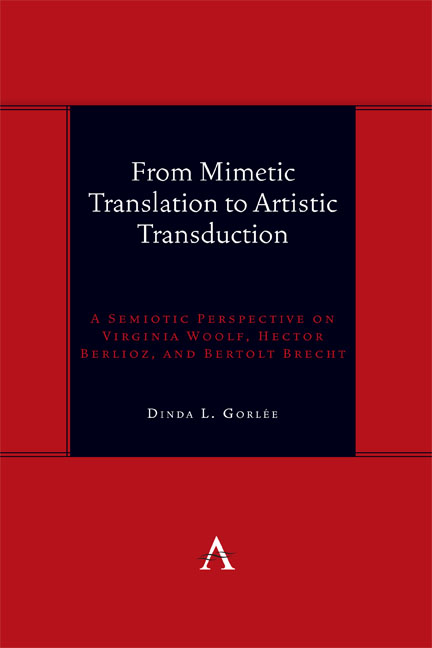 From Mimetic Translation to Artistic Transduction
From Mimetic Translation to Artistic Transduction Book contents
- Frontmatter
- Dedication
- Contents
- 1 Forked Tongues: Theory from Translation to Transduction
- 2 Wave after Wave: Wagner’s Waves Eclipsed by Virginia Woolf
- 3 War and Love: The Parabolic Retranslation in Berlioz’s Opera
- 4 The Threepenny Opera: Jakobson’s Poetics Retranslated in the Spirit of Brecht’s Work-Plays
- Bibliography
- Index
3 - War and Love: The Parabolic Retranslation in Berlioz’s Opera
Published online by Cambridge University Press: 01 March 2024
- Frontmatter
- Dedication
- Contents
- 1 Forked Tongues: Theory from Translation to Transduction
- 2 Wave after Wave: Wagner’s Waves Eclipsed by Virginia Woolf
- 3 War and Love: The Parabolic Retranslation in Berlioz’s Opera
- 4 The Threepenny Opera: Jakobson’s Poetics Retranslated in the Spirit of Brecht’s Work-Plays
- Bibliography
- Index
Summary
Berlioz's Poetical Drama
The French composer Hector Berlioz (1803–1869) was born in La Côte-Saint-André in the department of Isère, which is located in the Rhône Valley, close to the Alps, halfway between Grenoble and Lyon. The Berlioz family had some distinction in the French region. Hector's father, Dr. Louis Berlioz, was a successful and prosperous physician in the region (see Berlioz's bibliography, Cairns 1989/1999: 3–5). He practiced healing through acupuncture to relieve chronic pain, thereby attempting to introduce this healing practice to the Western world. Acupuncture comes from Chinese medicine, originating two thousand years before the birth of Christianity, but in the Napoleonic era, acupuncture was regarded as an alternative, even occult, pseudoscience. Dr. Berlioz furthered Western medicine, helping take it from the simple observation of symptoms to the scientific reality of being able to heal patients as experienced today.
Louis Berlioz had an inquisitive mind with logical rigor, but for his children he was also interested in poetic literature, fine arts and music. His son Hector Berlioz was born in 1803. Hector turned against the financial chaos of the Old Regime. As a pioneer of the French Revolution, he seemed to mark a turning point in politics. As a result of his fascination with Napoleon's tumultuous, but short-lived, government, Hector Berlioz furnished Napoleonic ideas to the modern world. He advocated the revolutionary ideas of liberty, equality and fraternity to serve as a movement against the world of the privileged classes. Hector gained his initial education under his father's guidance. Under his father's tutelage, Hector engaged in scholarly pursuits that included the study of intellectual subjects such as Latin grammar, French literature, history and geography. In 1821, Hector passed his examinations in philosophy and rhetoric to enter the French baccalauréat in Grenoble. His Latin specialty was the ancient literature of Virgil's Aeneid, Horace and Cicero, which he had read and translated with his father (Cairns 1989/1999, 46–60). The two of them shared an enjoyment of Virgil's long poems in Latin, which Hector retranslated into French lyrics. In adapting this version, he found himself caught up in the difficulty of readapting Virgil's verse into French lyrics for the romantic opera, The Trojans.
- Type
- Chapter
- Information
- From Mimetic Translation to Artistic TransductionA Semiotic Perspective on Virginia Woolf, Hector Berlioz, and Bertolt Brecht, pp. 89 - 128Publisher: Anthem PressPrint publication year: 2023


